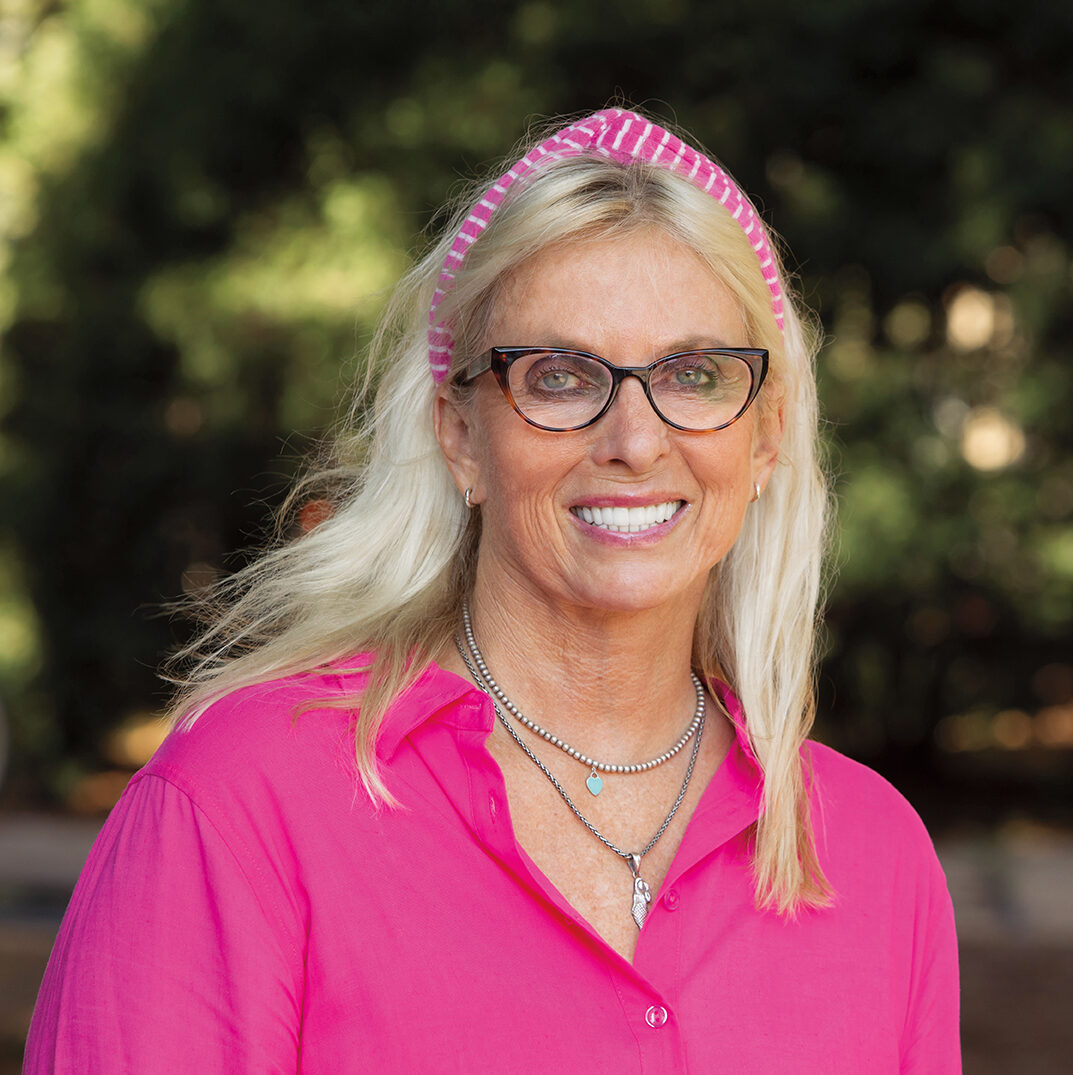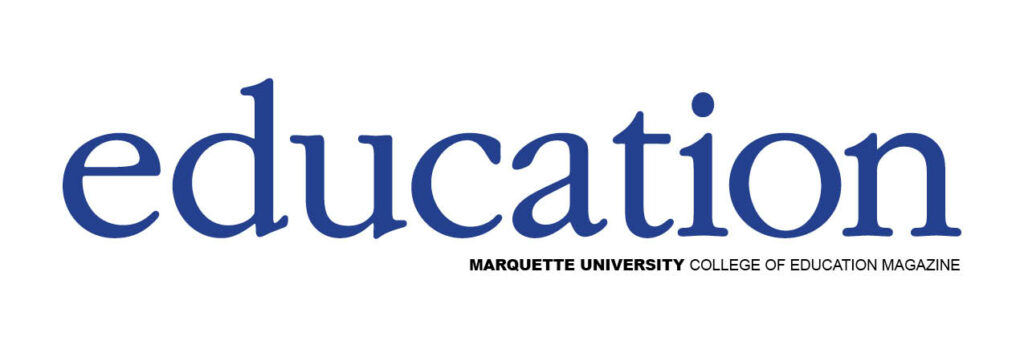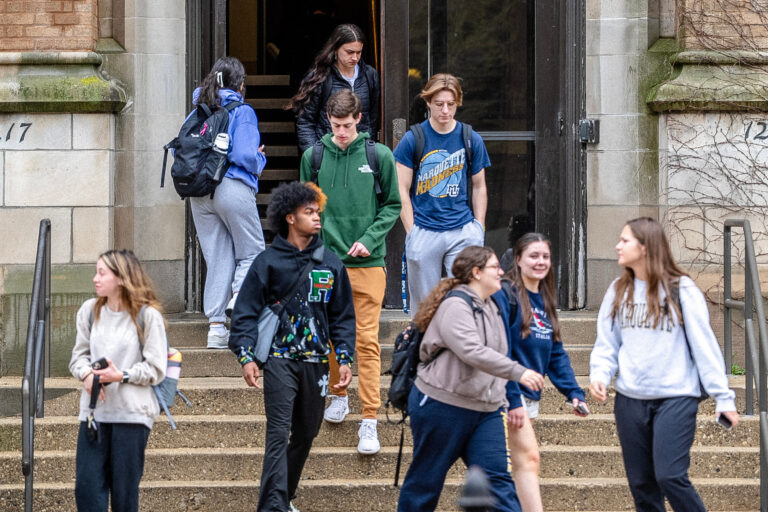A comprehensive and thoughtful overhaul of the teacher education curriculum ensures Marquette educators enter their classrooms prepared to be advocates for all.

By Diane M. Bacha
Mya Coene remembers being a high school student with a love of history and a lot of questions. Why, she wondered, do some histories seem to be missing from our classroom lessons?
When a teacher at her school in Rock Island, Illinois, recommended she do some additional reading to explore a more balanced understanding of the history of Christopher Columbus, she says, “It really opened the door to me about doing my own research and thinking critically about history.”
Coene, who will graduate in 2022 majoring in secondary education and history and minoring in broad field social science, is committed to creating a different experience for the students she will one day teach. She wants to encourage tough questions like the ones she asked, and she wants to turn those questions into learning opportunities.
Aspirations like Coene’s are, in many ways, at the heart of a major curriculum overhaul at the College of Education — the first of its kind for the college since 2003 and one that took four years to design and launch. It required teams to assess the college’s entire course catalog, rewrite guiding principles, redesign six courses and create eight new ones.
The first redesigned course rolled out in fall 2019 with Coene in attendance. The first education students to experience four years of the new curriculum will graduate in 2023.
“It’s big,” says Dr. Terry Burant, director of teacher education, who led the process. “It has been a four-year undertaking that’s vitally important to the way we prepare teachers.”
A redesign grows
“We have to do what?”
That’s how Burant reacted when, mere weeks into her job, she learned that the task of redesigning the education curriculum had suddenly become much more complicated. The reason: major changes to teacher education licensure policies in Wisconsin.
The new rules, announced by the Wisconsin Department of Public Instruction in 2017, were multifaceted, but the most significant effect on curriculum was a redefined range of skills required for elementary and secondary educators. Elementary education students who once were licensed to teach first through eighth grade must now be licensed for kindergarten through ninth grade. Secondary licensure was expanded by two grades, from fourth to 12th instead of sixth through 12th. In addition, separate endorsements for specific subjects, such as chemistry, history or journalism, would no longer be available; they’ve been replaced by broader endorsements such as science and social studies.
Adapting to the new requirements was a big job for any education institution. But it was made even bigger because the DPI also required every educator-preparation program to submit a new application. This required hair-raising levels of detail that would take two years to prepare.
“I had no idea what I was getting myself into,” Burant says with a laugh.
The DPI development, while significant, was secondary to a bigger task Burant was leading — assessing the department’s entire education curriculum to bring it in line with current research, better align it with key Marquette principles, and correct the inevitable “curricular drifting” that happens over time.

The process involved brainstorming with a wide range of stakeholders, starting with Educational Policy and Leadership Department faculty and staff and the Teacher Education Committee. Burant held focus groups with alumni and students (sometimes serving homemade mac and cheese). She sought insights from educators who had hired Marquette graduates.
As they sketched out their vision, Burant and her team started with changes that were obvious, such as bringing focus to “a few critical courses that had become as vast as Lake Superior but not as deep.” Other questions emerged early: Are elementary majors learning enough about writing instruction? Are secondary students getting enough field experience? How can we prepare our teachers to interpret and use assessment data?
And if we want Marquette graduates to be uniquely prepared to teach with qualities that reflect their Jesuit education when they graduate, how would we achieve that?
Layered over questions like these was the knowledge that teacher preparation has changed quite significantly in the past 10 years, according to Dr. Leigh van den Kieboom, Grad ’08, associate dean and a longtime member of the Teacher Education Committee. Chief among those changes is a trend toward practice-based instruction. “One of the nagging concerns about teacher preparation is that our students take educational foundations and theories and methods courses, but what they learn in these courses is often disconnected from actual practice,” she adds.
Burant and van den Kieboom were proud of Marquette’s reputation for turning out skilled, prepared teachers, but they and the committee saw room to do better.
Founded on essential skills and Jesuit values
What emerged from the years of research and discussion was a holistic, integrated program shaped by four guiding standards (see below). The first and fourth standards represent the Jesuit- and Marquette-centered values of equity and justice and the concept of cura personalis, or care for the whole person. The second and third represent the essential skills a teacher will need to be successful.
The framing value-based standards give students purpose. The skill-based standards give them tangible tools they’ll use to pursue that purpose in the classroom. It’s a curriculum that emphasizes ambitious instruction — finding ways to help any student from any background achieve — and prioritizes practice instead of theory.
“It’s a pretty big shift,” says van den Kieboom. It means, for instance, eliciting student prior knowledge and then emphasizing reasoning and communication skills when working out a math problem, and discussing different ways to approach and solve the problem. “Whereas 15, 20 years ago it was more about checking to see if the students get the problem right.”
When Burant and van den Kieboom describe the new curriculum, they talk about bedrock skills such as writing lesson plans, assessing student learning, making effective presentations and managing a classroom. Marquette education students are now exposed to these areas earlier, and they are required to practice them in recorded sessions critiqued by professors and classmates.
Just as important: learning how to build relationships with communities, facilitate difficult discussions, discern issues of equity and justice, and bring intention to every lesson. While theory still plays an important role, “We wanted all the students right from the start to learn the very practical skills of thinking carefully about what it was that they intend to teach, and why and how to best accomplish their goals for their students,” Burant says.
Buttressing ambition with tools
Coene was in attendance when Burant taught the first of two newly created classes — Teaching Practice 1: Instructional Design and Teaching Models, and Advanced Teaching Practice in Middle and High School.
Coene says it felt weird, at first, to see classmates rewind her recorded practice exercises, pause, write something down, and press play again. But she knows the experience was preparing her for students like the one she was — students who would ask tough questions. The new classes taught her to facilitate conversations and gave her resources she expects to continually draw upon.
“If I want to bring a more well-rounded history to my classes and include the marginalized communities, then discussion is probably one of the best ways to go about doing that,” Coene says. “Being able to actually facilitate those conversations in the classes that Dr. Burant taught has given me methods to do that successfully. It has been really helpful for how I want to approach my teaching.”
Burant is excited to see Coene and others from those first classes start student teaching in spring 2022.
“They should be much better prepared to think carefully about, well, what methods will work best for the content I intend to teach? What do I want the students to know and be able to do? What kind of teaching models fit with the things I’m trying to do?”
And, says Burant, “I want them to be relentless. To believe in every core of their being that, yes, I can make a difference here. And I have the tools to do it.”
Guiding Standards for a Marquette Educator
- An advocate and practitioner of equity and justice in schools and communities
- A designer and facilitator of ambitious curriculum and pedagogy informed by theory, context, and students’ thinking and experiences
- An imaginative critical thinker who reflects on ways to improve teaching and learning
- A compassionate professional who embodies cura personalis and empowers learners through reciprocal relationships of dignity and respect




